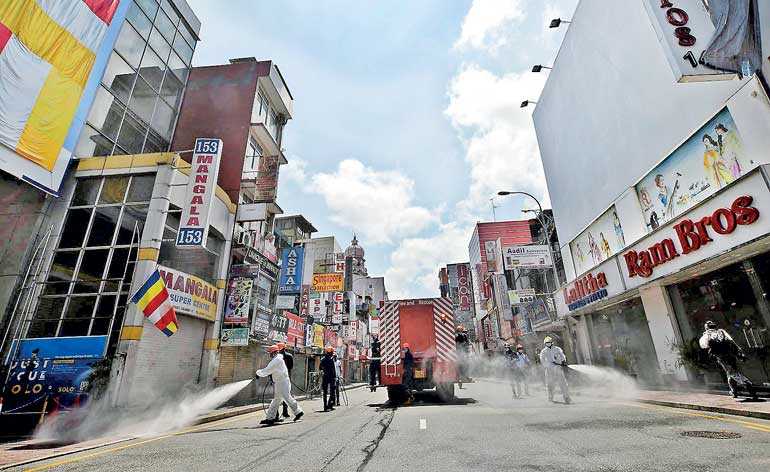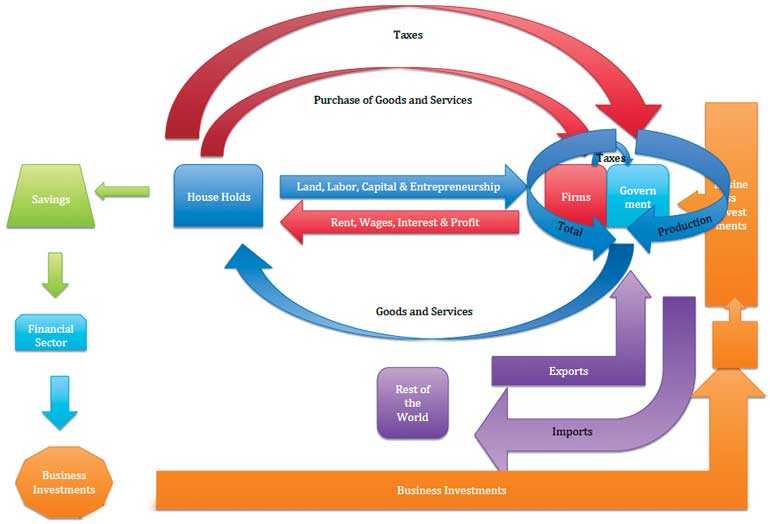Saturday Feb 21, 2026
Saturday Feb 21, 2026
Tuesday, 19 May 2020 00:15 - - {{hitsCtrl.values.hits}}

Sri Lanka is a nation with greater resilience, which has been proven in the past overcoming major issues, and we can revive the economy for the benefit of our fellow citizens – Pic by Shehan Gunasekara
By Dr. Ananda Kulatunga
Over the past decade, Sri Lanka has made rapid strides toward its development goals, halving its poverty rate to low single digits and improving human development despite the setback of economic development due to 30 years of war, which ended in 2009. While the country now stands close to reaching upper middle income status, it needs to foster more inclusive and sustainable momentum for economic growth.
In 2019, Sri Lanka’s economic growth remained subdued as it faced challenges stemming from domestic and external factors. As per economic data published by Central Bank of Sri Lanka GDP Q4/19 is Rs. 2,737,830 million (at constant 2010 prices).
The agriculture, industries and services sectors contributed Rs. 185,458 million, Rs. 621,663 million and Rs. 1,507,963 million respectively. It is noticeable that the agricultural sector has an increase of Rs. 11,824 million.
In terms of the goods and services exported and imported during Q4/19, the country has imported more goods of $2,385 million than its exports while the services sector has more exports of $703 million than its exports. However the leakage from the economy is $1,682 million, it is an increase of $299 million compared to Q3/19. There can be good reason for this fluctuation of such outcomes due to depreciation of the LKR against the US$.
The labour force in Q4/19 was 8.569 million whilst the unemployment rate was 4.5% and the labour force participation rate is 51.9%. Looking at the data of course one can imagine that how the nation’s economy is performing. The country’s population has increased by 226,000 to 21,670,000 compared to 21,444,000 in Q3/19.
However, let’s look at the total debt: Q4/19 was Rs. 13,031,543 million, nearly half Rs. 6,402,439 is foreign debt. Sri Lanka also has official reserve assets of $7,525.7 million (Mar/20), compared to decrease of $412.5 million from Q4/19.

The economic growth is 2.3% in 2019 compared to 3.3% in 2018 and the forecast for 2020 is 1.5% due to the COVID-19 pandemic.
With the COVID-19 pandemic, the nation’s economy is affected similar to any other countries in the world. With the ongoing locked down, the Government, private sector and the general public are getting used to new way of attending to day-to-day work. People think about what is essential and manage with available resources.
However, this situation is not sustainable, but some of the good habits learned in this process can be used for economic progress of the country. Some of the new ways can be getting the majority of people to use bank cards as opposed to cash transactions, curtail unessential imports while increasing exports, more products to be manufactured within the country, and for the Government to increase engagement in the economic activities as it already has the mechanism to do so.
The distribution of commodities was very well functioned with co-operative societies around the country and it was established in 1906 under British ruling in order to fulfil the economic needs of rural farming communities. The mechanism is available for the Government to engage trading activities of purchasing and selling country produce, which the Government stepped in to do via purchasing of rice and vegetables recently.
Engineering, pharmacies, hospitals, schools, transports, universities, and retail outlets are some areas in which the Government is currently engaged in as a mix-economic model. The Government needs to expand its capacity to operate similar to the private sector that can be competitive in order to attract skilled professionals which is a necessary factor in order to operate an effective venture.
The remodelling of the circular flow of income is best suited to the above process. In this new model, the Government and private sector contribute to the economy hand in hand and at the same time the Government collects taxes from firms as well as Government business entities. The taxation of the whole sector is essential to operate sustainable machinery of the Government. When the Government does business it will be in the best interest of own economy such as local production at an affordable cost and also competitive selling price for the public and also the export market.
The private sector too can compete with the Government in order to make profits by producing high quality products.
It is vital to operate a careful external sector in order to earn export revenue and import essential goods and service such as oil, gas and allied services. If the external sector provides positive outcomes it leads to prosperity of the nation.
Foreign Direct Investments especially for BOT projects provide much support for the nation in the long run.
As Sri Lanka is a nation with greater resilience, which has been proven in the past overcoming major issues, I believe we can revive the economy for the benefit of our fellow citizens.
(The writer is an Economic Strategist.)